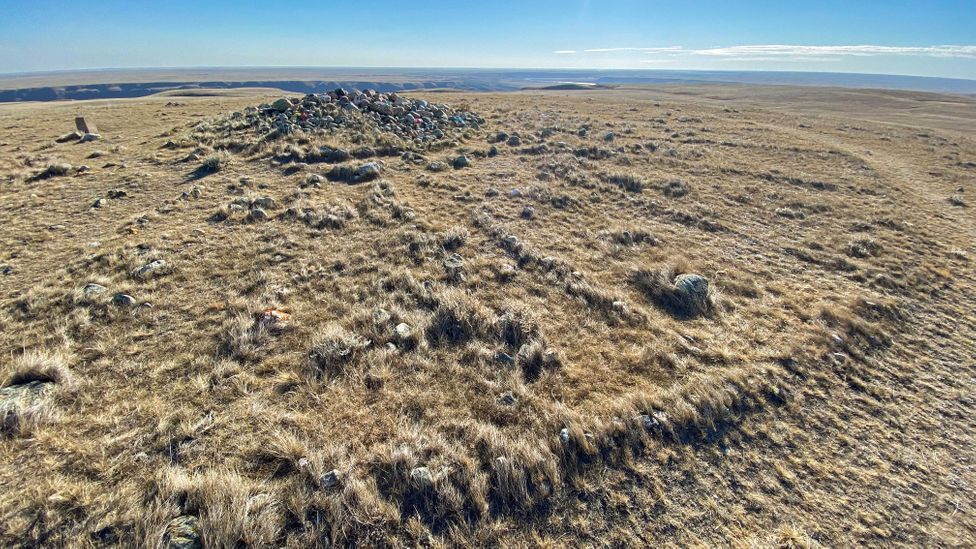Anthropology
Related: About this forumIniskim Umaapi: Is this Canada's 'Stonehenge'?
(Image credit: Greg Olsen)

By Debbie Olsen
10th January 2022
Built by ancient Indigenous People and long considered to be sacred, the Iniskim Umaapi medicine wheel in Alberta is one of the oldest religious monuments in the world.
About a year into the Covid-19 pandemic, Laura Sitting Eagle was feeling unwell. The Blackfoot Elder, who resides on Siksika 146 – a First Nations reserve of the Siksika Nation in southern Alberta, 87km south-east of Calgary – went to see her doctor and was informed that anxiety was the issue. With a daughter working as a frontline healthcare worker and a school vice-principal son, she was worried for the health of her family and the stress was affecting her own wellbeing. She realised that she needed to get emotional, spiritual, physical and mental balance.
As her ancestors before her had done, she found relief in making a trek to the medicine wheel called Iniskim Umaapi to pray and make a spiritual offering.
One of the oldest religious monuments in the world, the medicine wheel sits on a windswept hill far from any signs of civilisation. It consists of a central cairn surrounded by 28 radiating stone lines that are encircled by another large ring of stones measuring 27m in diameter. The Blackfoot have many names for it, but the current commonly accepted name is Iniskim Umaapi, which means "buffalo calling stones sacred site". European colonists named the stone circle Majorville Medicine Wheel, after the Majorville post office and general store that was once nearby. Settlers called these structures medicine wheels because they resemble wagon wheels and are considered sacred sites by Indigenous People. Regardless of their name, these enigmatic geoglyphs are shrouded in mystery – Iniskim Umaapi more so than any others.
Medicine wheels are scattered across the Northern Plains, in Montana, Wyoming, Saskatchewan and Alberta, but Iniskim Umaapi is the oldest-known one in the world. Archaeological studies estimate the ancient stone circle to be about 5,000 years old – dating roughly the same time as the first phase of construction of Stonehenge. Located on England's Salisbury Plain, Stonehenge is thousands of kilometres and an ocean apart from Iniskim Umaapi. The fact that both stone circles are ancient and have mysterious purposes and origins led to Iniskim Umaapi being dubbed "Canada's Stonehenge" by Gordon R Freeman, professor emeritus at the University of Alberta.
More:
https://www.bbc.com/travel/article/20220109-iniskim-umaapi-is-this-canadas-stonehenge
multigraincracker
(34,075 posts)Judi Lynn
(162,376 posts)Interesting Michigan Stone Structures
clarkc46
March 26, 2015
Short article excerpt:
I also came across many articles on a Stonehenge like structure that has been discovered deep under the waters of Lake Michigan. The structure was discovered in two thousand and seven by a university professor with sonar who was surveying the lake floor for shipwrecks near Traverse City. While they found the usual ships, cars, and even an old pier, they also made a fascinating, and potentially prehistoric discovery. One of the stones on the outer circle appears to have a carving of a mastodon, which is a prehistoric, elephant like animal that is thought to have gone extinct approximately ten thousand years ago. The carving of the mastodon indicates that the structure itself may be over ten thousand years old. The structure is also under 40 feet of water, which suggests that it was most likely built before the land became a lake, which also indicates that it was constructed over ten thousand years ago. This structure has not been extensively studied, due to the fact that it is so deep under water. The problem arises when many of the experts on carving and glyphs are not divers, so they cannot examine the stones and inscriptions up close and person to verify or dispute the authenticity. There is evidence of other stone circles and petroglyphs in the Great Lakes region, which makes it possible that this is an authentic, prehistoric site.
http://anthropology.msu.edu/anp264-ss15/2015/03/26/interesting-michigan-stone-structures/
. . .
Thank you for mentioning this site which sounds like something which deserves serious attention. I noted a short time ago, looking through info. for references that the people on Beaver Island don't want others to call attention to it and attract a lot of traffic from people wanting to find out more for themselves!
I think it has been the policy from the first, for European-descended geniuses to assume there is nothing in the Americas to care about, it was all empty except for a few "Indians" and that's why they've always called it the "New World." Clearly, "they" were greedy, merciless, murderous idiots who refused to treat the inhabitants with respect before murdering them and taking their homeland after the genocide. . . .
L. Coyote
(51,133 posts)Claims regarding alignments lack credibility due to the very small size of the monument. Even larger Big Horn Medicine Wheel lacks confidence in accuracy of measured alignment of spokes.
Big Horn Medicine Wheel
Summer Solstice, 2006
http://jqjacobs.net/blog/bighorn.html